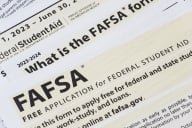You have /5 articles left.
Sign up for a free account or log in.

VectorCookies/iStock/Getty Images Plus
As anyone who even glances at this publication knows, diversity, equity and inclusion (DEI) efforts are not popular with some state lawmakers. Southern and Central states in particular are outlawing various forms of DEI in higher ed right and left (or rather, given the composition of our legislatures, right and right). But if you’re wondering what DEI can actually look like in practice in those places, what follows is my experience on a hiring committee for a job in American history at the University of South Carolina Lancaster.
I wasn’t thrilled that we asked candidates for standalone statements on DEI. It’s already hard to apply for academic jobs, what with the CV, the sometimes pages-long cover letter, the buggy human resources forms, and the letters of recommendation from people nobody wants to bother yet again. (Applying for jobs at public institutions often requires more paperwork than at private ones, with some community college job applications feeling like jobs in themselves.) It hardly seemed inclusive to make applicants jump through another hoop only to be rejected in the end, as most of them would be. Plus, it would mean more work for the committee. But in the end, the committee decided the possible benefits outweighed the drawbacks and asked for the statements.
That decision I’d found annoying at first turned out surprisingly well. Why? Because candidates for professorships have lookalike transcripts with strings of identical grades. Their recommenders heap on the praise. Their CVs are perfectly polished, and their letters sound like they’ve been workshopped by a committee of Ph.Ds., because they have. Not so the diversity statements. Maybe because they’re newish, they were one of the few places where we could see the individual human beings behind the formulaic professional applications.
So, what did the candidates say in their diversity statements? All kinds of things. They were less generic than statements of teaching philosophy. Teaching philosophies always seem to involve student-centered pedagogy and flipped classrooms. These are laudable and no doubt sincere goals, but after the umpteenth time one sees a version of “My teaching relies on student-centered learning,” it loses some rhetorical impact. (I sometimes find myself imagining other versions when fatigue weakens my morals: My teaching relies mostly on caffeine alternated with Benadryl. I envision my courses as mutual nonaggression pacts—I won’t challenge students and they won’t give me bad course evaluations. I flipped the classroom by deciding never to come to campus again.)
The DEI statements, in contrast, weren’t predictable. I’d thought they’d mostly focus on race, with a side of gender. That wasn’t always the case. One candidate said he made sure the textbook was free. Another mentioned online office hours for students who couldn’t be on campus. Some had widened the range of perspectives in their readings to include more primary texts by women. One mentioned making the attendance policy more flexible for students who were sick. Others wrote that African-American history and European-American history were inseparable. They were generally modest in their aims. Progressives might have found that modesty disappointing, and others might have found it realistic.
Reading them, I realized I might have been a better new professor if I’d written one too. Most people who teach need to communicate with people from varied backgrounds, but we’re not always prepared for that even when we’re graduates of state universities. A representative memory: soon after I’d started teaching at an open-admissions college for the first time, I had a student who refused to answer even the most basic queries about the in-class reading. These were warm-up questions, I thought. I’d wanted to put the class at ease before we moved on to more challenging topics. This student, though, wouldn’t play. Nor would she say why she wouldn’t. It was supposed to be a discussion-based class. At times I let my irritation show.
It took me longer than it might have to realize that the questions I thought were simple were ones she had no chance of understanding. She wasn’t being a jerk—her vocabulary just didn’t extend to the words I was asking about. She didn’t feel like being open about that in front of people with widely ranging abilities.
Later that semester, during the kind of low-octane, how-was-your-weekend conversation people make in the classroom before it’s time to start, I casually mentioned being hungry. It was meant to be a throwaway remark. Somebody nearby had takeout that smelled good. I’d had a decent breakfast, as always, and I would soon have a solid lunch, something reasonably complex with spices and grain and protein, maybe fresh fruit too. But the student who wouldn’t participate materialized at the front of the room offering me half of her paper-bagged meal (it was, in fact, the one that smelled good). We didn’t have much rapport, but she’d heard my offhand comment and responded with instant generosity. Hunger was not just fodder for small talk, not to her. It was serious. And she was up for suffering her own in order to relieve mine.
I wish I could say that we all ended up sharing a meal, and that after various heroic struggles, everybody passed the class. Neither of those things happened. The student didn’t pass my class, and I don’t think she graduated. Would it have made a difference if I’d thought more about inclusion before getting that teaching job? Would I have understood my student’s silence as vulnerability rather than as refusal of education? Would any of the middle-class professionals she encountered, if asked to think about diversity as a condition of our jobs, have been more able to see her differences from us as sources of strength rather than just of weakness? I don’t know. It certainly wouldn’t have hurt.
Anyway, here’s what we didn’t see in the DEI statements we read on the search committee: Nobody swore fealty to Karl Marx. Nobody bemoaned white privilege or masculinity, toxic or otherwise. If there were apologies for churchgoing, I missed them. Nor do I remember anyone telling us their political party, gender, sexual orientation, or opinions of critical race theory or wokeness—though if they had, that would have been fine, as long as they were thoughtful about it.
What wouldn’t have come off well? Whatever the opposite of DEI is—Monoculture, Inequity, Exclusion?—wouldn’t have been a hit. If we’d seen robotically doctrinaire recitations of stereotypically leftwing or rightwing values, the committee wouldn’t have been into those either. Self-righteousness would have likewise tanked, but we didn’t get any of that. Candidates understood that we weren’t looking for ideologues (for one thing, they’re a pain in the ass at faculty meetings). I wish more legislators understood that too.
Instead, the DEI statements we got were what you’d want from good teachers, ones who know that students sometimes need encouragement more than they need a display of somebody else’s brilliance. They helped us hire a skilled, dedicated colleague who has since done prize-winning research on top of his teaching responsibilities.
And what do I make of the activists and legislators trying to stamp out diversity statements, including in South Carolina? From my experience, they’re off-base. Those anti-DEI campaigns aren’t helping us retain good faculty, either. Recently, we lost a well-loved African-Americanist, a colleague of many talents, to a state with higher taxes, pricier houses, and worse weather—but no inclination to punish diversity efforts. He supported those efforts. I doubt he’ll be back soon.
My state’s leaders do have some great ideas for education. A recent bill would make school board meetings more accessible. A program in my own county covers college book fees. It’s not in either plan’s name, but you could call the larger goal . . . DEI. It’s for everyone.








